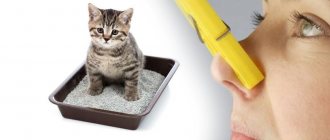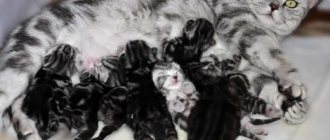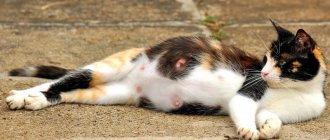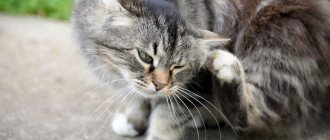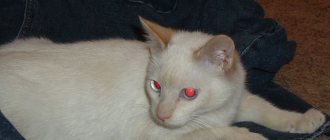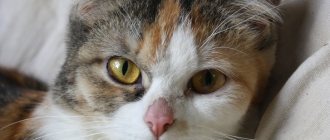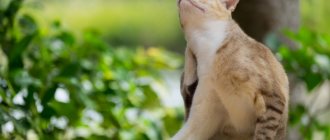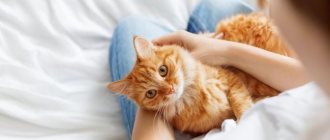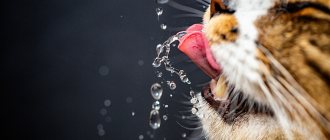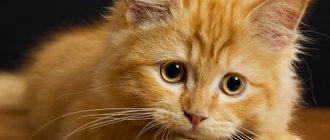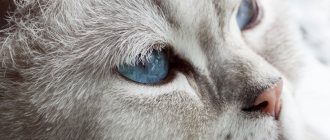Heart disease in an animal is always difficult to predict. Pets are not people; they cannot tell if they are experiencing chest pain. That's why so many mustachioed friends die from heart disease. Heart attacks in cats most often occur suddenly, so it is important for the owner to know what the symptoms and causes of this disease are, as well as how to treat it.
Veterinarians note that myocardial infarction is very rare in felines, but this does not diminish its health hazard. It is caused by the death of a section of the pet's heart muscle. This provokes severe dysfunction in the functioning of a vital organ. Without medical intervention, the animal will soon die.
Causes of a heart attack in a cat
As a rule, such reasons are associated with other diseases in the cat:
- Various congenital heart defects. The main anomalies leading to a heart attack are associated with pathology of the valvular apparatus of the heart.
- Heart rhythm disturbances.
- Genetically determined diseases of the vascular bed.
- Vasculitis is an inflammatory disease of blood vessels. A smaller amount of blood arrives from inflamed vessels to the myocardium. This leads to disruption of the nutrition of cardiomyocytes. Heart muscle cells cannot tolerate prolonged hypoxia. Ischemia of the cardiac muscle tissue occurs quickly.
- As an animal ages, changes in the structure of the myocardium may occur, which can also cause a cat to have a heart attack.
- Infection of a cat with helminths and blockage of blood vessels by them.
- If there was a blood clot somewhere in the pet’s vascular bed, it broke off and blocked the coronary artery - myocardial infarction is inevitable.
- Blockage of the arteries supplying the heart by emboli (an air bubble in the blood or a fat drop) will also lead to the death of myocytes.
- Diseases of the endocrine system (diabetes mellitus, hyperthyroidism) contribute to the occurrence of a heart attack.
- Infectious diseases in cats contribute to heart attacks. Especially if they are chronic.
- Loss of large amounts of blood, leading to severe anemia. In such a situation, myocardial trophism sharply worsens.
- Poisoning with pesticides, heavy metals and FOS also has a detrimental effect on the heart.
- Malnutrition of the cat, due to which plaques are deposited on the vessels.
- Chronic stressful situations.
Attention!
A fat cat with cheeks is a cute sight. But everything should be in moderation. You should not overfeed your cat if you do not want to get serious health problems in the future.
What can cause heart disease in animals
Depending on the origin, myocardial pathologies are divided into 2 large groups:
- Congenital – defects of blood vessels and valves. Problems with the myocardium occur in young pets, often up to a year old - shortness of breath, cyanotic tongue, fainting. Symptoms vary depending on the severity of the disease, ranging from subtle symptoms to death.
- Acquired - heart problems often appear with age, mainly after 7, less often 2-3 years. They can also be the result of injuries, neoplasms, past diseases - viral, bacterial, parasitic, autoimmune.
Symptoms: When should you worry?
Not all cats are prone to coronary heart disease.
Most often, it affects cats that lead a sedentary lifestyle and love to eat a lot. Therefore, even if the cat lives in an apartment with little space, you need to play with it a lot so that it develops physically. Forays outside will also be useful.
You also shouldn't keep your cat stressed all the time. Animals really don’t like changing homes or owners. For them, just like for people, losing a loved one or furry friend is scary.
When should an owner worry that something bad has happened to his pet?
Clinical symptoms of myocardial infarction in a cat:
- The cat becomes excited and nervous. She rushes from corner to corner.
- Due to severe pain, the cat meows loudly and constantly. Sometimes even her usual “meow” is more like just a heart-rending scream.
- The pupils become sharply dilated even during daylight hours.
- The purr loses its appetite.
- Shortness of breath appears.
- The cat starts coughing.
- The cat begins to limp on the left side due to severe pain.
- If you try to listen to your pet's heart, it will pound. This phenomenon is called tachycardia.
- The mucous membranes become pale or even bluish.
Important!
If the slightest signs described above appear, you need to immediately take your cat to a veterinary clinic!
Symptoms of the disease
The main symptoms characteristic of a heart attack in cats:
- pain in the left paw in the elbow area, manifested in lameness;
- painful chest;
- a state of anxiety, excitement, often accompanied by meowing;
- pallor, cyanosis of mucous membranes and skin;
- dyspnea;
- dilated pupils;
- severe weakness that replaces excitement;
- lack of appetite;
- poor coordination of movements, unsteady gait;
- presence of arrhythmia;
- increased heart rate.
All of the above symptoms may be present at the same time. However, the presence of only some of them cannot be ruled out.
Diagnosis of myocardial infarction
A veterinary doctor can start thinking about myocardial infarction as soon as he sees the animal, since the symptoms are quite vivid and characteristic.
Thanks to instrumental diagnostic methods (echocardiography, electrocardiography), the veterinarian will carry out a differential diagnosis of a heart attack with other heart diseases that can cause similar symptoms, and will also check for brain diseases.
These are pathologies such as inflammatory diseases of the membranes of the walls of the heart (endocarditis, myocarditis, pericarditis, pancarditis), myocardosis, and various types of cardiomyopathy.
The distinctive features of a heart attack from any other heart disease on the ECG are:
- Pathological ST segment elevation.
- The growth of the Q wave is the main wave indicating the process of ischemia.
- Signs of bundle branch block appear.
An ultrasound can show interruptions in the functioning of the affected chamber of the heart (right and left ventricle).
Treatment of myocardial infarction in cats
Attention!
The only help that will be useful for a cat with a developing heart attack from the owner is to provide complete rest and safe transport to a veterinary clinic. Other attempts to do anything to the animal may result in its death.
A veterinarian or veterinary cardiologist prescribes the following therapy:
- The first thing to do is relieve pain. For this purpose, ketofen, a non-steroidal anti-inflammatory drug manufactured for use in veterinary medicine, is widely used;
- To improve heart function, nitroglycerin and its closest analogues are prescribed.
- To prevent thrombosis, antiplatelet agents and anticoagulants are used.
- To improve the rheological properties of blood, it is important to remove excess fluid. For this purpose, various diuretics are prescribed.
- To calm the animal after suffering stress, it is necessary to give sedatives. An inexpensive and effective representative are Kot Bayun drops. It is made on the basis of herbal ingredients, so it rarely causes severe adverse reactions and allergies.
- To help the functioning of the surviving cardiomyocytes, the cat should be given the vitamins and minerals that the heart needs (vitamin B6, potassium, magnesium and others).
In the post-infarction period, the cat needs to be provided with complete rest, care, proper nutrition, fresh air and its own shelter, where it can hide and be alone.
You can include kefir, yoghurt, and sugar-free milk porridge in your cat’s diet. Baby food is good for feeding a cat. You can give both infant formula and pureed meat with vegetables.
Among industrial feeds, it is better to give preference to premium feed lines. Dry food can be given only of high quality, purchased from a veterinary pharmacy.
Reference!
For variety, the porridge can be prepared with chicken broth. This delicacy will please the purring family member.
Preventive actions
A house with toys will help your pet keep its heart healthy.
To prevent myocardial infarction in cats, it is important for owners to provide the animal with moderate physical activity in the fresh air. If you send your pet outside or you can’t go for a walk with him, you can set up a house for your cat with toys on the balcony. Playing with cat objects increases the load on the heart, making the heart muscle stronger and less susceptible to an attack.
An important preventative measure is the hygiene of the animal and keeping its tray clean. There are a variety of parasites in the cat's litter box, so it is important to clean it after each pet's bowel movement. In addition, the owner needs to diversify the animal’s diet and include foods containing sufficient amounts of vitamins and minerals.
Veterinarians advise giving cats boiled potatoes, legumes, fish and dairy products. The animal can also obtain useful substances from vitamin-mineral complexes, which are given in the spring and autumn. You can buy them in pharmacy chains. Owners should also regularly visit a veterinarian with their cat, which will allow them to identify any pathologies of the cardiovascular system at the initial stages of development, carry out their timely treatment and prevent the development of serious complications that can even lead to death.
What are the correct living conditions for a cat that has had a heart attack?
- Complete peace. There is no need to once again let children near her, pulling her tail and mustache.
- Silence. A huge noisy party is not at all what an unhealthy ward craves.
- Fresh air. The room where the cat lives should be well ventilated. However, drafts at home are unacceptable.
- Proper nutrition.
- A cat should have its own dark corner.
- Stressful situations should be kept to a minimum. Let the worst thing for a cat be a trip to the veterinarian.
First aid from the owner
The first thing to do if you suspect a heart attack is to call your veterinarian. According to the symptoms described by the owner, he will recommend giving the animal Corvalol or another drug.
IMPORTANT! You should not give any medications without a doctor’s instructions, otherwise your pet’s condition will only worsen!
What to do next:
- Provide the cat with complete rest - do not shift him or disturb him, do not make noise near him.
- The room in which the patient is located should be well ventilated; extreme heat and stuffiness should not be allowed.
- It is highly advisable to have a veterinarian come to your home. If this is not possible, ONLY use a carrier with a hard plastic bottom.
- Do not give water or food to the patient; if the veterinarian recommends any medications over the phone, give them strictly in liquid form or in the form of an injection.
Remember that you can’t help anything at home, so you definitely need to show the sick person to a specialist.
What should a cat's diet be?
- Industrial feed should not be of the mass market class (Kitekat, Whiskas, Felix and others). You should switch your cat to premium food (Hill's, Royal Canin, Purina Pro Plan and others) sold in veterinary pharmacies. They will be useful not only for the cat’s heart, but also for her entire body. Even dry food is unlikely to give your pet urolithiasis, the development of which is caused by cheap dry food.
- No matter how compassionate a cat’s eyes may be, you should never give her treats from the master’s table. It is especially worth excluding pork, lard, fried meat and fish from the diet of your favorite animal.
- Baby food is good for feeding.
Prevention of cardiovascular diseases in pets
- If your pet is at risk, upon reaching the age of 5, take him to a cardiologist once a year and have an electrocardiogram done.
- See a doctor if your animal's breathing becomes faster after slight exercise or at rest. Pay attention to other symptoms of heart failure - most notably, increased fatigue.
- Get vaccinated regularly.
- Give deworming medication once a quarter. Dirofilariasis (heartworm) is a deadly disease that is very common in dogs.
- Don't yell at your pet or family.
- Place your dog's or cat's sleeping place away from heating appliances.
- Do not overload your pet, avoid too intense exercise.
- Do not give food from the table, especially fatty, fried, peppered, rich in seasonings.
Prevention of myocardial infarction
- From childhood, accustom your cat to active games. Let her run after a thread or a red dot from a laser pointer. The main thing is to let her run around as much as possible.
- Proper nutrition. There is no need to make the animal become obese.
- Do not expose your cat to severe chronic stress. Yes, cats are also worried about daily scandals at home, constant curses at them over trifles and beatings from their owners. If a cat eats sloppily, this does not mean that it should be physically punished immediately. After all, we can all knock over a plate or cup sometimes.
- Walking in the fresh air for about 30 minutes a day has a good effect.
